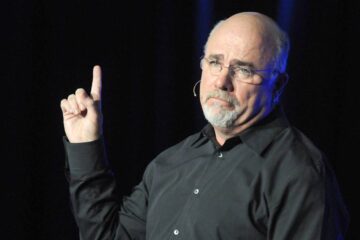Muhammad Ali may have had the “Thrilla in Manilla” but Herb Kelleher had “Malice in Dallas.”
In 1992, Southwest Airlines (LUV) was being threatened by Stevens Aviation with a trademark lawsuit over the use of the “Just Plane Smart” motto.
Related: Analyst revamps Amazon stock forecast before earnings
But instead going to court, Kelleher, Southwest’s co-founder and then CEO, went old school and settled the matter by arm-wrestling Stevens Aviation’s top executive, Kurt Herwald.
Kelleher lost the match — but was allowed to use the slogan in exchange for a $5,000 charitable donation and conceding Stevens’s legal claim to the slogan.
The event is just one story from Kelleher’s rather colorful career. Kelleher, who died in 2019, was known to dress up like Elvis Presley and go on TV with a paper bag over his head.
He is also credited with revolutionizing air travel by practically inventing the low-cost, low-fare airline.
“We have a strategic plan,” he once said. “It’s called ‘doing things.'”
One of those things was open seating, where passengers picked their seats as they boarded the aircraft.
The model worked for many years, but then the financials started to go south and Southwest had to scramble.
Analysts are reacting to Southwest Airlines recent announcements.
Shutterstock
Southwest CEO: Open seating ‘no longer optimal’
The airline recently unveiled several changes, including flying red-eye overnight flights for the first time and ending the 50-year tradition of open seating.
“It’s clear that the open-seating model that served us well for so many years is no longer optimal for today’s customer,” Bob Jordan, president and CEO, told analysts during the company’s second-quarter earnings call. “I want to stress that this decision was not made lightly.”
Related: Top analyst defends Tesla stock price target despite earnings slump
Jordan said the airline had been “very thorough and deliberate in how we approach the question, conducting multiple sophisticated research studies over many months that evaluated customer preference and looked at different types of cabin layouts and seating methods.
“Our research shows that 80% of our customers prefer an assigned seat, and 86% of our potential customers prefer an assigned seat,” he said. “Further, when a customer defects from Southwest to one of our competitors, our open-seating policy is cited as the No. 1 reason why.”
The airline said second-quarter revenue rose 4.5% from a year earlier to $7.35 billion, but earnings dropped more than 46% to $367 million, or 58 cents a share.
Jordan acknowledged the company’s problems and told analysts that the overall results “are not where we need them to be, and they are not reflective of what we are capable of delivering.”
“We continue to have confidence that the new revenue management system will be a driver of long-term revenue improvement,” he said. “Doing so requires an evaluation of all opportunities and a willingness to evolve some longstanding selfless policies while staying true to our values.”
The assigned-seating plan has not been well-received in some circles.
“By removing its open-seating policy, its last remaining meaningful distinction, Southwest finally is admitting that it has become just like American, United and Delta,” the Chicago Tribune said in a July 30 editorial. “So by all means, assign seats, Southwest, and make your extra buck. But remember your customer.”
“And we’ll miss the days of $49, grabbing the first seat we can find and scooting off fast with a very fun crew.”
Elliott: Southwest Air changes ‘too little, too late’
Elliott Investment Management bought $1.9 billion of Southwest Airlines shares in June and has sought the ouster of Jordan and Chairman Gary Kelly, citing what it called “poor execution and leadership’s stubborn unwillingness to evolve the company’s strategy.”
The investment firm was not impressed with Southwest’s announced plans and described them as “obvious attempts at self-preservation.”
More Wall Street Analysts:
Analyst revisits Nvidia stock price target after Blackwell checksAnalysts prescribe new Walgreens stock price targets after earningsAnalyst revises Facebook parent stock price target in AI arms race
“Southwest’s announcement of revenue-enhancement initiatives, purporting to offer assigned seating, premium-seating options and red-eye flights, comes more than a decade late, and after a 50% decline in its share price over the past three years,” the firm said on behalf of Partner John Pike and Portfolio Manager Bobby Xu. “Too little, too late is not a strategy. It’s time for new leadership.”
Analysts have reacted to Southwest’s actions by adjusting their ratings and stock-price targets.
Citi lowered the firm’s price target on Southwest to $28.25 from $29 while affirming a neutral rating on the shares.
The airline’s announced revenue-management strategies seem to go against the view that the current management team is unwilling to change, the investment firm said in a research note.
But Citi also said “the jury is out on whether domestic-oriented discount carriers can transform themselves in a manner in which their unit economics can start to approach those of the strongest network airlines.”
A few days earlier, Deutsche Bank analyst Michael Linenberg had downgraded Southwest to hold from buy with a price target of $29, down from $32.
Despite reporting record revenue driven by record passenger volumes, Southwest’s profit margins remain pressured as revenue generation continues to lag its elevated cost structure, the analyst said.
While encouraged by Southwest’s plans to add assigned seats, a premium on-board product, and the launch of red-eye flights, Linenberg said these initiatives will take time to roll out and are not without execution risk. As such, the investment firm sees near-term earnings pressure, the analyst said.
Related: Veteran fund manager sees world of pain coming for stocks


